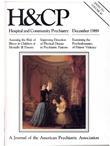Children of Psychiatrically Ill Parents: A Prevention Perspective
Abstract
A number of risk factors have been associated with the etiology and pathogenesis of psychiatric disorders in children of psychiatrically ill parents. The author reviews the evidence for genetic transmission of psychopathology in families, particularly depression, schizophrenia, and alcoholism. Genetic factors appear to play less of a role in transmission than the characteristics of the child and the environmental consequences of the parent's illness. Some risk factors, such as ineffective parenting, poor communication patterns, and chaotic environments, may be modified by preventive interventions. Such interventions can improve family stability, foster the parents' ability to meet the child's needs, and minimize the pathology to which the child is exposed. Broad-based preventive interventions for the general population are also discussed.
Access content
To read the fulltext, please use one of the options below to sign in or purchase access.- Personal login
- Institutional Login
- Sign in via OpenAthens
- Register for access
-
Please login/register if you wish to pair your device and check access availability.
Not a subscriber?
PsychiatryOnline subscription options offer access to the DSM-5 library, books, journals, CME, and patient resources. This all-in-one virtual library provides psychiatrists and mental health professionals with key resources for diagnosis, treatment, research, and professional development.
Need more help? PsychiatryOnline Customer Service may be reached by emailing [email protected] or by calling 800-368-5777 (in the U.S.) or 703-907-7322 (outside the U.S.).



